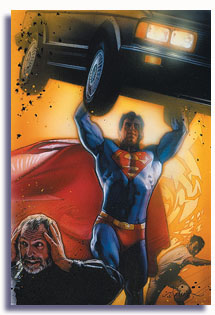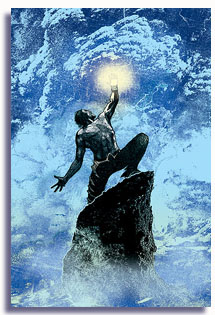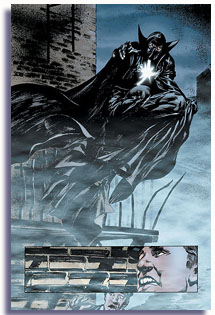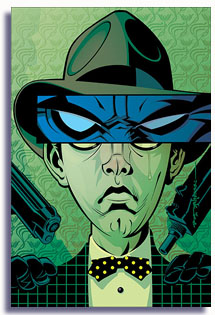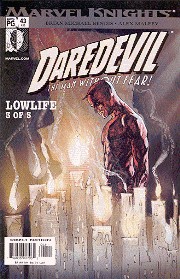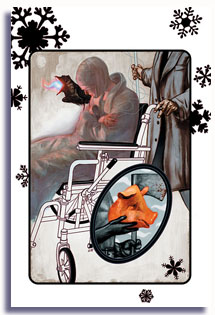|
Hey
Kids! Comics!
Action
Comics #800
writer: Joe Kelly
artists: various
Anniversary
issues are always a dicey proposition. Usually, editors arrange
storylines so that the big event can stand free, and then
the story that does make the anniversary issue ends up being
little more than a tribute to the character. You get some
nice pin-ups in the bargain, but for some of us, that's not
much consolation.
But when
the grand-daddy of superhero comics reaches its 800th issue,
even the most cynical fan has to at least give it a look.
Yes, Action Comics #800 fulfills all the stereotypical
expectations, though it does have the decency to build the
pin-ups into the story.
Maybe
it's the times, though. Spending a double-sized issue extolling
the virtues of a man who strives to do what's right at all
costs, who inspires others to do right, both in a fictional
realm and perhaps the real world, well, I needed it.
Kelly
runs with the book's sixty-five year history, weaving that
in and out of the narrative. As various people speak of the
impact of Superman on their lives, it's obvious that continuity
has been thrown to the wind.
It's
okay. Matched with some really great art, including the obligatory
Alex Ross appearance, the narrative does a good job of dissecting
just why Superman has lasted. If every creative team could
remember this on a monthly basis, we'd probably be reading
more of the books regularly.
Rating:

Aquaman
#3
writer: Rick Veitch
artists: Yvel Guichet and Mark Propst
Something
is rotten in the state of Atlantis, but that should come as
no surprise. Such a state of affairs plays to Guichet's strengths
as an artist, and Veitch really lets the penciller run through
the dark world of magick that now rules the sea.
Though
a few writers, notably Peter David, have run Aquaman through
sword and sorcery paces before, Veitch has a fresh take, and
not just in terms of the water that Aquaman now depends upon.
In three issues he has firmly established a new status quo,
successfully changed Arthur Curry's uniform, and still left
us with questions that we're willing to wait to see resolved.
Best of all, he has gotten rid of the savage sea-king thing.
Now we have an Aquaman somewhere between the two extremes.
Maybe this one will work.
The King
Arthur connection still works, too, because Veitch isn't overplaying
it. Yet. Through Aquaman, he seems to be ready to explore
older myths of Camelot and its predecessors, so if we're not
careful, we might learn something of historical value.
If the
rest of the Justice League stays away for a while (though
Veitch has proven he writes them well, too), you might just
forget this is a superhero book, and get wrapped up in a decent
fantasy.
I know,
I know - aren't they all supposed to be that?
Rating:

Astro
City: Local Heroes #1
writer: Kurt Busiek
artist: Brent Anderson
Several
years ago, Busiek launched this series with a voice that brought
a truly fresh angle to the superhero genre. Pick up any of
the trade paperbacks, and you'll find a story that makes you
think of something you never thought about before. It raised
the bar for what could and should be done in comics on a regular
basis.
And then
Busiek got sick. It made his output on the series spotty,
and then finally stopped him for two years. He and artists
Alex Ross (covers and character design) and Brent Anderson
have returned, but in their absence, others picked up the
gauntlet. Is there still room for Astro City to be
hot and daring?
From
this first issue in a series of mini-series (a wiser and more
honest approach to publication), the answer is probably no.
Busiek re-introduces the reader to Astro City, and reminds
us who the major players (if it could be said to have such)
are. The trouble is, almost everybody picking up this book
already knows.
We've
already seen the common man's viewpoint, masterfully given
to us by Busiek himself years before. The narration of Pete
Donacek, hotel doorman, has a bit of sameness to it. Though
Busiek delivers a slight twist, it doesn't really go as far
to explain Pete's love of the city as the writer thinks. We're
also in a time when comics have fallen all over themselves
to laud everyday heroes.
You can
understand the impulse. A fresh launch, with a lot of industry
attention, probably will bring in new readers. If this is
your first visit to Astro City, then enjoy. Anderson is a
solid long-time artist, whose work never disappoints. Busiek
is a master of characterization.
It's
just that a lot of other writers have caught on, and are doing
what Busiek was doing all along. Now he needs to set a new
level. Hopefully, future issues will.
Rating:

Batman:
Legends of the Dark Knight #164
writer: Dwayne McDuffie
artists: Val Semeiks and Dan Green
For the
return engagement of an unexpectly popular minor character,
McDuffie wisely changes up genres. When we first met Lee Hyland,
he was a small-time con man with a great gift. Though blind,
he could see through the eyes of whoever he had last touched.
Then,
the story involved Lee helping Batman bring murderers to justice.
And now the tables are turned a bit, as Batman seeks Lee out
for help breaking up a baby-kidnapping ring, but discovers
that the government has found out what the blind man can see.
Anybody
who has followed the recent Checkmate contretemps in
the regular books knows that Batman and government agents
just don't get along. And perhaps we all wish it wasn't believable
that a government agency would just hijack an American citizen
as it does Hyland. Sure, it's for the public good. But it's
still sweet to see Batman "persuade" two agents to give up
what they know through a unique joy ride.
Some
might call it a good old-fashioned keel hauling. But that's
splitting hairs.
McDuffie
writes a good Dark Knight, grim, determined, but still with
a sense of justice and more importantly decency. Sometimes
that gets lost in the regular books. Matching him with a good
sense of action is Semeiks, though his style is inconsistent.
At times he seems to be riffing off of Joe Staton, not bad
in itself, but he bounces in and out of a more realistic style.
Rating:

Daredevil
#43
writer: Brian Michael Bendis
artist: Alex Maleev
On the
week that he makes his big-screen debut, Daredevil spends
an issue of his own comic without a single super-villain.
Instead, Bendis devotes most of this book to an examination
of Matt Murdock's character, and it's quality stuff.
Working
from a seed of arrogance that has been part of Matt's personality,
we see a man absolutely sure of the rightness of his actions.
But this issue is all about shaking up that surety.
The blindwoman
Milla has tumbled onto his identity so easily. Too easily,
really, for Matt's comfort. And yet he finds himself strangely
enjoying the sparring of alternately denying and subconsciously
confirming her findings. His enjoyment ends quickly, however,
in a confrontation with Luke Cage.
Cage
has never been a character I much responded to, but Bendis
uses him to make some interesting arguments. For the first
time in this arc, we see Matt blow up in righteous anger,
and also for the first time, it's clear he's not too sure
he's actually right. Some people want to be masters of the
world, and they can't even be masters of their own backyard.
Running
in the background of all this is the brilliant idea of MGH
- Mutant Growth Hormone. This deadly designer drug sparks
users into temporary fits of (only sometimes) mild superpowers.
In the closest thing we'll get to a crossover, Jessica Jones
is also battling its presence on the streets. You don't need
to read Alias, but it is providing an interesting perspective
on the story. Over there, Jessica admitted to herself that
she may be in love with Matt Murdock.
Knowing
her character, she may never admit it, and it won't cause
problems in this book. But then again, it might. Just when
you think you have Bendis figured out, he might do something
unexpected by doing the expected.
Rating:

Fables
#10
writer: Bill Willingham
artists: Mark Buckingham and Steve Leialoha
And so
it's all over but the trials. Luckily for Fable Town, the
revolution failed. Willingham spares us the suspense by letting
us know what happened up front, because he's in a hurry to
introduce more interesting concepts.
In the
previous issue's cliffhanger, Snow White had her head blown
off, but awakens a few weeks later hospitalized but well on
her way to recovery. Through a confrontation with her sister
Rose Red, we learn something new and interesting about the
Fables, and perhaps just why they are so long-lived.
Along
the way Willingham also drops a little commentary about how
our culture has streamlined and in many ways defanged these
stories. Wisely, he does it without judgment, and we can make
up our own minds. But it's definitely something to chew over.
Now we
have a new status quo, and though Willingham as said as much
in interviews anyway, a greater sense of the overall Fables
story arc. All stories must come to an end, but Snow White
at least leaves the door open for their finale to be a long
way off.
Rating:

|
